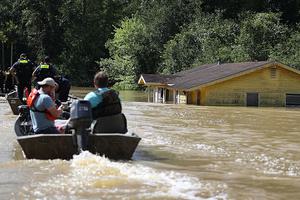Climate
-
Wildlife Farming: Does It Help Or Hurt Threatened Species?
Wildlife farming is being touted as a way to protect endangered species while providing food and boosting incomes in rural areas. But some conservation scientists argue that such practices fail to benefit beleaguered wildlife.
-
Science in the Wild: The Legacy Of the U.S. National Park System
As the National Park Service marks its centennial this month, the parks are being celebrated for their natural beauty and priceless recreational opportunities. But they also provide a less recognized benefit: the parks serve as a living laboratory for critical scientific research.
-
Video Contest Winner - 1st Place
The Dungeness Crab Faces Uncertain Future on West Coast
-
Rocky Flats: A Wildlife Refuge Confronts Its Radioactive Past
The Rocky Flats Plant outside Denver was a key U.S. nuclear facility during the Cold War. Now, following a $7 billion cleanup, the government is preparing to open a wildlife refuge on the site to the public, amid warnings from some scientists that residual plutonium may still pose serious health risks.
-
Video Contest Winner - Runner Up
After Denial: How People React to the Hard Reality of Climate Change
-
The New Green Grid: Utilities Deploy ‘Virtual Power Plants’
By linking together networks of energy-efficient buildings, solar installations, and batteries, a growing number of companies in the U.S. and Europe are helping utilities reduce energy demand at peak hours and supply targeted areas with renewably generated electricity.
-
Sticker Shock: The Soaring Costs Of Germany’s Nuclear Shutdown
German Chancellor Angela Merkel’s 2011 decision to rapidly phase out the country’s 17 nuclear power reactors has left the government and utilities with a massive problem: How to clean up and store large amounts of nuclear waste and other radioactive material.
-
At Ground Zero for Rising Seas, TV Weatherman Talks Climate
John Morales is part of a new breed of television weather forecasters seeking to educate viewers on climate change and the threat it poses. In South Florida, where sea level rise is already causing periodic flooding, he has a receptive audience.
-
How Growing Sea Plants Can Help Slow Ocean Acidification
Researchers are finding that kelp, eelgrass, and other vegetation can effectively absorb CO2 and reduce acidity in the ocean. Growing these plants in local waters, scientists say, could help mitigate the damaging impacts of acidification on marine life.
-
Floating Solar: A Win-Win for Drought-Stricken Lakes in U.S.
Floating solar panel arrays are increasingly being deployed in places as diverse as Brazil and Japan. One prime spot for these “floatovoltaic” projects could be the sunbaked U.S. Southwest, where they could produce clean energy and prevent evaporation in major man-made reservoirs.
-
Can Virtual Reality Emerge As a Tool for Conservation?
New advances in technology are sparking efforts to use virtual reality to help people gain a deeper appreciation of environmental challenges. VR experiences, researchers say, can be especially useful in conveying key issues that are slow to develop, such as climate change and extinction.
-
Unable to Endure Rising Seas, Alaskan Villages Stuck in Limbo
As an advocate for Alaska’s Native communities, Robin Bronen points to a bureaucratic Catch-22 — villages cannot get government support to relocate in the face of climate-induced threats, but they are no longer receiving funds to repair their crumbling infrastructure.
-
What Would a Global Warming Increase of 1.5 Degrees Be Like?
The Paris climate conference set the ambitious goal of finding ways to limit global warming to 1.5 degrees Celsius, rather than the previous threshold of 2 degrees. But what would be the difference between a 1.5 and 2 degree world? And how realistic is such a target?
-
A Rather Bizarre Bivalve Stirs Controversy in the Puget Sound
The Asian market for the odd-looking giant clams known as geoducks has spawned a growing aquaculture industry in Washington's Puget Sound. But coastal homeowners and some conservationists are concerned about the impact of these farming operations on the sound’s ecosystem.
-
At 1,066 Feet Above Rainforest, A View of the Changing Amazon
A steel structure in the Amazon, taller than the Eiffel Tower, will soon begin monitoring the atmosphere above the world’s largest tropical forest, providing an international team of scientists with key insights into how this vital region may be affected by global warming.
-
In Iowa, A Bipartisan Push to Become Leader in Wind Energy
Thanks to state officials who have long supported renewables, Iowa now leads all U.S. states in the percentage of its energy produced from wind. Big companies, including Facebook and Google, are taking notice and cite clean energy as a major reason for locating new facilities there.
-
Point/Counterpoint: Should Green Critics Reassess Ethanol?
Former U.S. Senator Timothy Wirth and former White House Counsel C. Boyden Gray argue that environmental criticisms of corn ethanol are unwarranted and that the amount in gasoline should be increased. In rebuttal, economist C. Ford Runge counters that any revisionist view of ethanol ignores its negative impacts on the environment and the food supply.
-
The Case Against More Ethanol: It’s Simply Bad for Environment
The revisionist effort to increase the percentage of ethanol blended with U.S. gasoline continues to ignore the major environmental impacts of growing corn for fuel and how it inevitably leads to higher prices for this staple food crop. It remains a bad idea whose time has passed.




